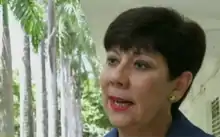Cecilia García Arocha
Cecilia Carlota García Arocha Márquez[1][2] (Caracas, Venezuela, 16 September 1953), known as Cecilia García Arocha, is the first female rector of the Central University of Venezuela (UCV). She is also a dentist, who graduated from the same university in 1976. She uses both of her father's surnames.
Doctora Cecilia García Arocha BSc, DDS, PhD | |
|---|---|
 | |
| Rector of the Central University of Venezuela | |
| Assumed office 16 May 2008 | |
| Preceded by | Antonio París |
| Personal details | |
| Born | Cecilia Carlota García Arocha Márquez 16 September 1953 Caracas, Venezuela |
| Parents | Acela Márquez Raúl García Arocha |
| Alma mater | Central University of Venezuela |
| Occupation | Professor, Dean, Secretary, Rector |
| Known for | First female rector of UCV |
Early life
García was born in Caracas, to a family of UCV alumni. Her father, Dr. Raúl García Arocha, was a dentist and she soon picked up the skills from him. The García Arocha family have a long history of dentistry in Caracas. Her mother is Acela Márquez.[2]
Career
García graduated with honours in 1976 from the UCV school of dentistry, she became a professor at the university in the School of Medicine. She later held relevant positions within the Faculty of Dentistry as an academic coordinator, the school director, and then became the first female Dean of the faculty. After her first term in this role, she was re-selected to continue for three more consecutive terms; the terms of three years each meant she headed Dentistry for twelve successive years (1993-2004).[2]
In her last year of Deanship, in 2004, García became part of the rectorial team of Antonio París, and París won the rectorship for that selection (2004-2008), and García was appointed university secretary, becoming the fourth woman to take this role. As secretary, she made considerable contributions to the restructuring of the Student Welfare Organization (OBE); she was a fighter for student rights and benefits, achieving improvements in the cafeteria services, transportation, and scholarships. In 2008, the team stood again, with García at the head, winning the second round of elections with 75% of the vote and so making history, with García the first woman to be rector of the Central University of Venezuela in its entire 286-year history.[2]
It was around the time of her departure from the Faculty of Dentistry that García completed a PhD in Management, also at UCV.[2] She has been given various awards and otherwise recognised for her continued contributions to the university and for significant scientific and academic conferences; for example, she has been inducted to both the Order "José María Vargas" and the Order "Merit of Workers".[3]
During her time as rector, there have been many attacks at the university. From 2008 to 2014 García reported nearly 100 crimes to the authorities, which were not looked at until the 2014 protests that saw many students rebel against the government; when García was called to testify, the blame was put on her. The government recommended an armed military presence around the campus, despite the latest acts of violence being from the national guard, which García successfully resisted. At this hearing, it was also claimed that there were administrative irregularities, and in October 2014 an investigation was opened by the government alleging inconsistencies in staff payments made by García.[2]
During the 2019 presidential crisis, García lent her support and that of UCV to Juan Guaidó,[4] and spoke out against the government preventing aid from entering Venezuela.[5]
References
- Mundial-AN, Yvke. "Compareció rectora de la UCV García "Marquez" ante el Poder Legislativo". Aporrea (in Spanish). Retrieved 2019-09-04.
- Poderopedia. "Cecilia García Arocha". Poderopedia Venezuela (in Spanish). Retrieved 2019-09-04.
- "Sintesis curricular rectora" (PDF). UCV.
- "Cecilia Garcia Arocha: A Juan Guaidó "Le ofrecemos todo el apoyo desde el punto de vista educativo" - El Pitazo". elpitazo.net. Retrieved 2019-09-04.
- "Cecilia García Arocha rechazó actos de violencia en contra del pueblo indígena en la frontera". El Universal (in Spanish). 2019-02-25. Retrieved 2019-09-04.